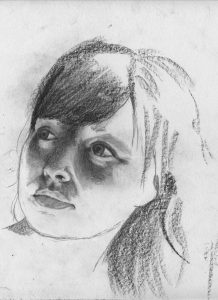
Spring in Hangzhou
Li Qingzhao, you lean
against the plum tree, blossoms
dropped on your shoulder,
your face once more flushed
with wine. Your silk robe, sleeves frayed,
has seen better days.
Mingcheng rose some hours
before you woke. By this time
he’s on a boat bound
for the capitol
to fix some political
mess of the ill-read
emperor and his
sycophants. Has beauty died?
Your hair, once ink black,
shows the first touches
of silver. You’re cursed to write
poems till dawn, each one
a meticulous
four-character, four-toned song
you sing to the mists.
The cries of wild geese
on their northern journey home
call to you. Their long
undulant threads pass
in and out of shrouds above
Flown-From-Afar Peak.
Who knows when Mingcheng
will return to touch your cheek?
You miss his caress
more than the moon. Now,
you’ve lost the fan he gave you—
one more cause for tears.
~Li Qingzhao, Song Dynasty poet, 1084-1155 A.D.
Edward Harkness
Review by Sheldon Lee Compton
I love historical poetry and fiction. As with this poem, I always read through the work once and then look up what I can find about the subjects, the events, and so forth. I then reread the work. Reading the history of Li Qingzhao and her husband Zhao Mingcheng brought so much more color and depth to Harkness’s poem. Whereas the first time around I noticed more about the crafting of the poem—the wonderful line breaks such as this one that transitions one stanza to the next: “You miss his caress/more than the moon.” The narrative, so to speak, covers the morning that Mingcheng left for his official duties. On that trip he was stricken with dysentery and later died. Li was left alone and never really recovered. This is uniquely covered within the poem. And it is done so with the same kind of beauty Li wrote herself as one of the greatest poets in her culture’s history. The addition of her name and dates of birth and death to conclude was a smart decision. All historically-based poetry or fiction should lead the reader to new information that enhances the experience. Harkness does so here with fantastic success.
Review by Douglas Thornton
The intriguing nature of this poem’s subject matter offers us a look into the life of one of China’s great poets. The unique simplicity of ancient Chinese poetry has been reproduced here by the revealing of very distinct details that give way, somewhere in the background, to a deeper and much more dire sense of the drama playing out, whether it be the langour of daily life or the idea of separation. The thing that has been captured well is the feeling of distance, not just among Li Qingzhao and Mingcheng, but of the exile (imposed or not) of the subject from the world, or from the reality that everyone has thought her to be a part of. We are left, in the end, with a profound sense of pity.
